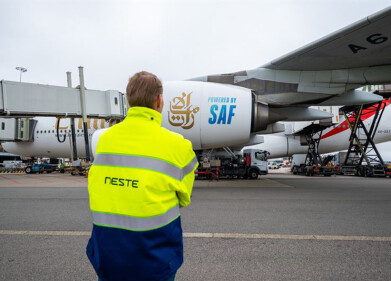Fuel for Thought
Waste Vegetable Oil to Stimulate Biodiesel Industry
Jan 10 2008
Martin Brocklehurst, Head of External Programmes at the Environment Agency, said: “Biodiesel derived from waste vegetable oil is carbonneutral; it reduces waste and improves resource efficiency.
“We have worked with the biodiesel industry to develop this proposal, a Quality Protocol for waste vegetable oil, which will save businesses the time and costs associated with meeting waste regulations.
“In deregulating biodiesel made from waste vegetable oil, the product can better compete with biodiesel derived from virgin oil. This will also increase the volume of waste vegetable oil recovered from places like takeaways, restaurants, chip shops and food manufacturing sites. It should also reduce the amount disposed to sewer with all the benefits that will bring to the water industry.
“We are now launching a 12week consultation and invite wider industry, trade bodies and the public to respond to this consultation.â€
By 2008/09, at least 2.5 per cent of fuel consumed in the United Kingdom must be biofuel, rising to five per cent in 2010/11.
“Despite approximately 100,000 tonnes of waste vegetable oil being collected from the catering and food industries each year, a considerable amount still goes uncollected and often ends up being poured down the drain. But a Quality Protocol should help stimulate the biodiesel industry to access this resource by providing assurances that waste vegetable oil and virgin oil can produce biodiesel of virtually the same qualityâ€, continued Martin Brocklehurst.
Waste vegetable oil has a high calorific value and although it may have come to the end of its useful life in cooking, the energy contained within is still present and can be used. In order to encourage the use of biodiesel derived from waste vegetable oil, biodiesel which meets the requirements of the Quality Protocol will not longer be require environmental authorisations for its storage and use as an engine fuel.
WRAP’s Dr Richard Swannell, Joint Project Executive for the Waste Protocols Project, said: “The Waste Protocols Project, run jointly by the Environment Agency and WRAP, demonstrates the benefits of working in collaboration with trade bodies, business and industry to develop solutions that meets the needs of the market whilst also protecting the environment. It shows a good example of the Environment Agency and WRAP easing regulation and creating new business opportunities.â€
Digital Edition
PIN 25.1 Feb/March
March 2024
In This Edition Safety - The technology behind the ION Science Tiger XT - Safety with ammonia and LOHCs as hydrogen carriers Analytical Instrumentation - Discussion on new tribology te...
View all digital editions
Events
Apr 22 2024 Hannover, Germany
Apr 22 2024 Marrakech, Morroco
Apr 22 2024 Muscat, Oman
Apr 22 2024 Rotterdam, Netherlands
Apr 23 2024 Singapore


















